Exploring the Uses of Patchouli Leaves and Their Plantation Method
Patchouli leaves are not only used for their fragrant properties in perfumes, skin care products, and incense, but also have a variety of other uses. They can be eaten as vegetables, made into herbal teas, or even used as an insect repellent.
In this blog, I will delve deeper into the versatility of patchouli leaves and explore the different ways they can be utilized.
Patchouli Leaves
Well known for its distinctive scent, Pogostemon Cablin – better known as patchouli – is a bush-like shrub from the tropical climates of South East Asia such as Malaysia and Indonesia.
It is from the same family of plants as mint, oregano and lavender and has been popular for centuries as incense, in aromatic oils, and in perfumes.
The patchouli shrub is a bushy plant that grows to about four feet in height in its native setting and can also be grown as an attractive houseplant provided it is grown in a warm, shaded environment.
What to Do with Patchouli Leaves?
The patchouli plant is a fragrant herb that is commonly known for it’s perfumery and aromatic properties.
The leaves are also used in cuisine and medicine. While some people might be familiar with the leaves being used in potpourri and incense, not everyone is aware of the culinary and medicinal uses.
How to Use Patchouli Leaves
Grown commercially, plants are trimmed two to three times a year and the leaves that are harvested during the rainy season (usually from April to October) are supposed to make the best quality oil.
The leaves are handpicked then left to ferment for a few days before being dried. Oil is then extracted from the dried leaves by steam distillation.
The leaves of the patchouli plant are used to add their fragrance to potpourri, deodorants, soaps and skin care products as well as in incense and aromatic oils. It can also be used as an insect repellent.
Patchouli oil (extracted from dried patchouli leaves) is believed to be a natural source of antioxidants, with some evidence suggesting that the oil may help to slow down the effects of aging and even reduce the appearance of wrinkles.
If you are looking for an herbal alternative to your skin care products, patchouli is a great choice.
Traditional Asian herbalists have for centuries used patchouli for a variety of ailments, most commonly as a treatment for infections, colds, and to help balance the body’s natural systems.
Culinary Uses
One frequent use of patchouli leaves is in making herbal tea. Dried patchouli leaves can be brewed as a tea and can offer many health benefits. These benefits include easing cold symptoms such as sore throats and headaches, and can help with stomach upsets.
It is also said to relieve depression providing feelings of relaxation, easing anxiety and stress.
The undried leaves are sometimes eaten as a vegetable, since it is an edible herb from the mint family, or it can be used as a seasoning or flavoring similar to mint and basil leaves. The raw leaves can also act as a breath freshener when chewed for a while.
There are some traditional herbal medicines from China and Indonesia which use dried, powdered patchouli leaves as an ingredient for its therapeutic qualities.
Smoking the Leaves
In some Asian cultures the dried patchouli leaves are smoked in hand-rolled cigarettes. Used in this way the leaves have a stimulant effect but at the same time inducing relaxation.
Insect Repellent
The patchouli leaf has a natural insect repellent effect, keeping away bugs and mosquitoes.
In earlier times patchouli leaves were packed in with clothing and materials such as silk that were transported from Asia to Europe.
This practice kept moths from damaging the fabrics, and can still be useful today – dried patchouli leaves can be stored in a linen cupboard or wardrobe to protect clothes and fabrics from damage by pests.
If you are looking for a safe and natural way to get rid of unwanted pests, you may consider patchouli.
Plantation of Patchouli Leaves
These leaves are quite sensitive and need a proper spot for growth. Mostly, they are cultivated in pots placed in an area where there is no direct sunlight. You can use any area that is under shade or have full-grown plants nearby providing enough shelter. Along with the location, other requirements for the plantation of these leaves are:
- Consider acidic yet rich soil to grow the leaves fully.
- Begin the plantation process in the spring when that temperature is moderate (not too low or not too high).
- Keep a 5 feet distance in between every plant for their full growth.
- Daily water the seeds for optimum growth.
Care Tips for Patchouli Plantation
A warm and humid environment is best for the full development of this herbal plant. It is highly sensitive to low temperatures so you need to plant it before winter. In the case of winter, you can use containers to plant the seeds which you take indoors in case of cold nights. Other suitable factors that assist in having highly green leaves are the following:
Dappled Light
Although this plant requires warm temperatures, direct sunlight is also harmful as it can burn the leaves. If you want to plant the seed in the garden then choose a spot where there is dappled sunlight. If you are planning to use an inside location then place the pot where there is also light coming out of windows or balconies.
Lesser Ph of Soil
7 Ph indicates that soil is neutral and you need to find a spot where pH is below it. Lesser values indicate the acidic nature and patchouli leaves grow well in such rich and moist soil.
Regular Watering
Keep an eye on the soil and water the seeds whenever the top inch soil is feeling dry. Especially in hot weather, you need to water the plant daily but remember that overwatering is also harmful so keep a limit.
In the cold weather, you don’t need to water daily. Likewise, pots kept in indoor places don’t need water more often. However, don’t let the plant or soil completely dry out.
Warm Temperature
This plant needs moderate temperature between 65°F to 85°F (18°C to 29°C) for proper growth. Too much cold or hot weather is unfavorable for the leaves. They will start curling or turning yellow. So, you need to be careful. In case of too high or too low temperature, keep the pot inside where there is indirect sunlight for moderate temperature.
All Purpose Plant Food Fertilizer
For the optimum growth of this herbal plant, you need to use well-balanced plant food to provide enough nutrients. The most commonly used fertilizer for such plants is NPK plant food which contains nitrogen (N), phosphorus (P), and potassium (K).
You have to give it after every 10 days for a month. After using the plant food thrice, use the fertilizer once a month. Some cultivators suggest not to use fertilizer in winter. So, one must consult about the right dosage and frequency for best results.
Frequently Asked Questions
Q: Which is the most common form of Patchouli leaves usage?
Many users prefer this herbal plant for usage in the form of essential oil. It is used in diluted form for topical application and also as a fragrance to use in a diffuser for aromatherapy.
Q: Are there any side effects of topical application of patchouli?
Some users face side effects like itching or redness of the skin by applying the patchouli oil in undiluted form. To avoid them, one must dilute it with any carrier oil before application to the skin.
Q: Why is patchouli associated with the hippie style?
Hippies used to apply the oil for its earthy smell to cover up the drugs smell or their bad hygiene condition. People who followed the hippie movement loved to try only natural products for their daily use. That is why patchouli leaves were associated with them.
Q: Are there any benefits of using patchouli for aromatherapy?
Yes, these leaves have a particular fragrance and their oil is used for aromatherapy. By putting the oil drops in a diffuser, it generates a positive effect on the mind and the body. It also generates a calm environment for meditation.
Parting Words
As you can see, patchouli leaves offer a wealth of benefits and are of great value to various industries. Their versatility and natural properties make them even more desirable.
With proper care, you can grow these magical leaves in your garden without any difficulty in getting their maximum benefits.
If you have any additional inquiries about patchouli leaves and their uses, feel free to share your thoughts in the comments section below.
Thank you for reading, and we hope this article has been both informative and enjoyable.

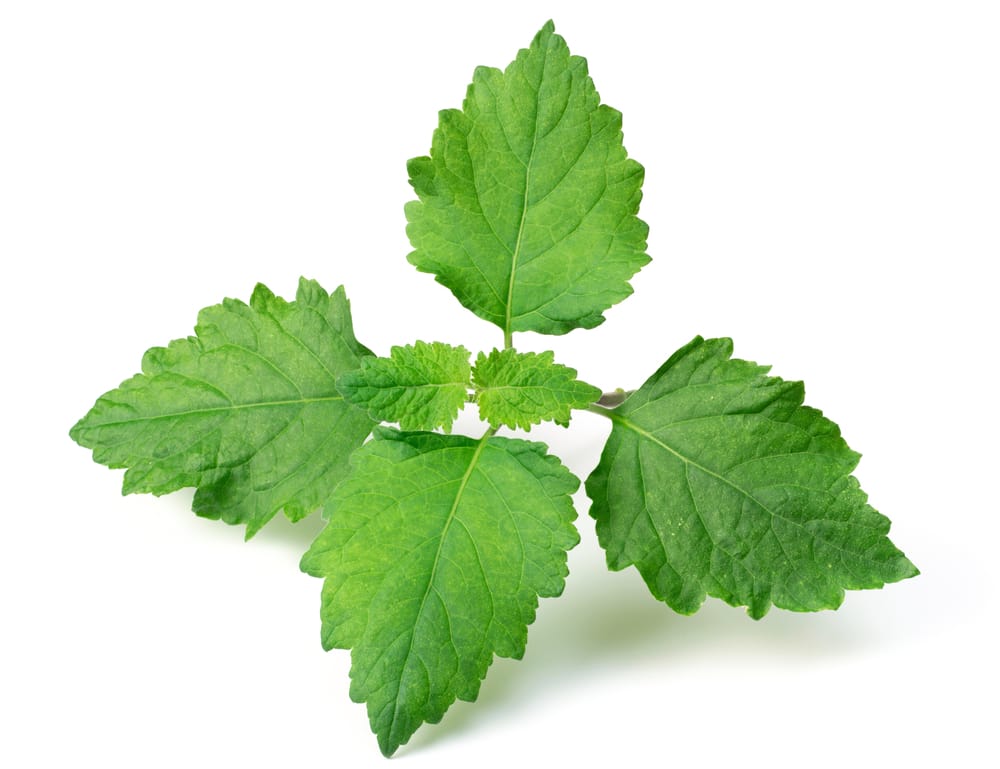
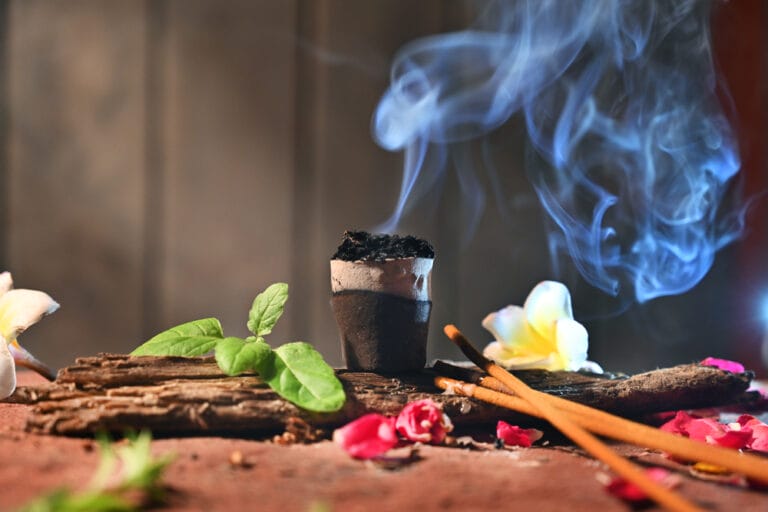
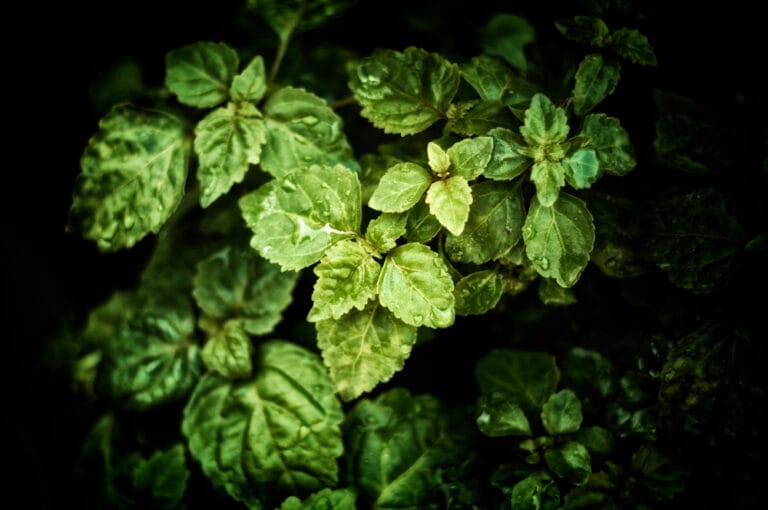

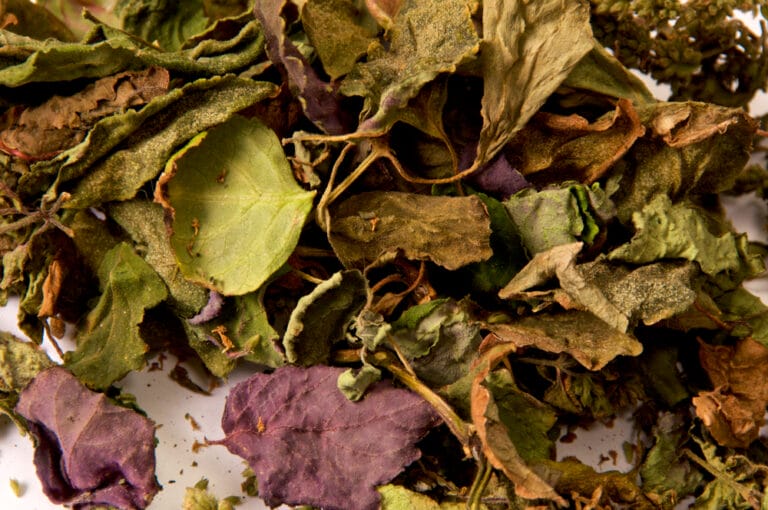
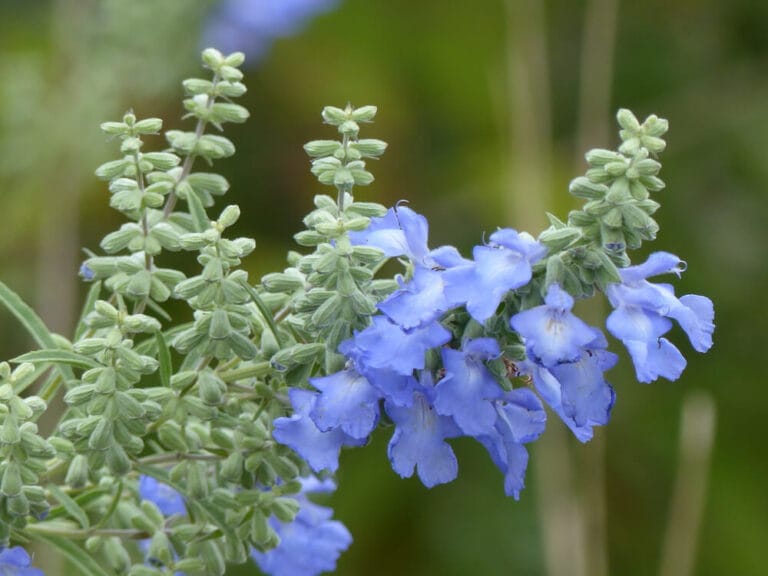
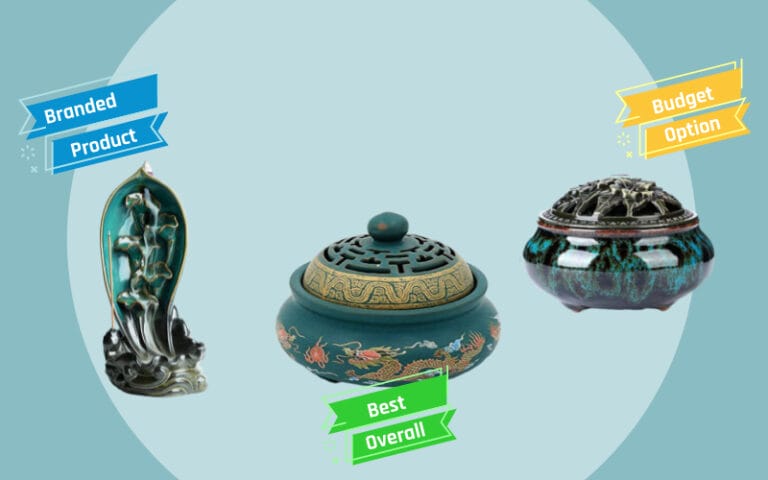
This was most helpful, thank you! I have patchouli growing in my garden, and it gets quite prolific. I just harvested a bunch of it and was wondering what I can do with it. I had heard you can make tea with it. I have never tried to yet. I would like to taste the raw leaf as well. When it flowers it is even more fragrant. I didn’t know you could smoke it. Thanks for the info!
I’m delighted to hear that the post was helpful to you, Mala!
I regularly write about patchouli and other incenses.
Thanks for visiting my site and I hope to see you again soon!